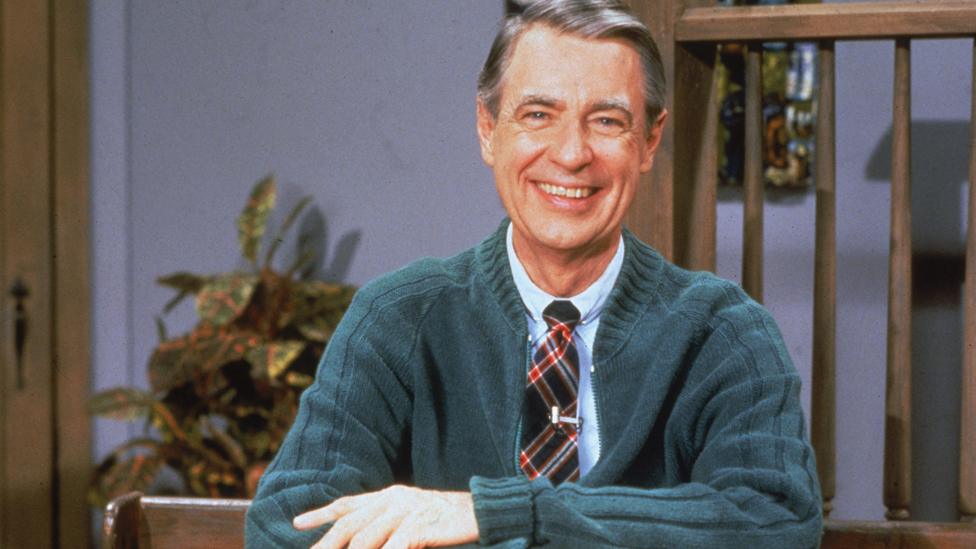The unlikely US box office stars
- Published
WATCH: Ginsburg and Rogers documentaries reviewed
America has two new unlikely box office stars - an 85-year-old Supreme Court Justice and a children's TV host who was in his mid-70s at the time of his death 15 years ago. They're both profiled in new documentaries which have been lighting up the US box office. Why now?
The film Won't You Be My Neighbor? - a portrait of children's TV presenter Fred Rogers - has taken in more than $20m (£14m), which is a remarkable amount for a small documentary.
RBG, which looks at the life of Supreme Court Justice Ruth Bader Ginsburg, has collected an impressive $13m (£10m).
Fred Rogers, whose TV show Mister Rogers' Neighborhood was on US public TV stations from 1968 to 2001, passionately believed that children deserved intelligent programming.
Morgan Neville, who directed Won't You Be My Neighbor, believes Rogers and his show have a message relevant to our times.
"What the show was doing was explaining to very young children, how to behave and how to treat other people, and how we co-exist with other people," he says.
"And we live in a time where nobody's advocating for those things anymore. If we don't nurture those things, we're in the kind of dangerous times we find ourselves in now."
RBG is also seen as putting the spotlight on an inspirational figure. As the documentary's co-director Julie Cohen points out, Ruth Bader Ginsburg is a very compelling subject.
"How could you not want to make a documentary about Ruth Bader Ginsburg?" she asks.
"She's this totally amazing person with a long history of being a Supreme Court Justice, but also when she was a lawyer going back to the 1970s, who fought for women's rights. She's become in recent years, this mega-celebrity, who millennials treat like a rock star."
Political factors may account for the popularity of these documentaries. For many moviegoers these non-fiction films provide positive and uplifting entertainment that's an alternative to the daily grind of news in politically polarised times.

"I think just the idea of having somebody advocate things like civility and kindness is desperately needed," says Neville.
"It's a message that I think everybody can get behind. And in a day and an age where common ground is a scarce commodity, to find something that can actually connect in that way feels optimistic for me."
Gina Duncan, who's in charge of operations at BAMcinématek in New York, thinks a shortage of strong role models also accounts for the the success of RBG and Won't You Be My Neighbor?
"I do think that both RBG and Fred Rogers are very adult figures and I think that's something we don't currently have," she says. "We don't have people on TV who we feel are true role models, and RBG and Fred Rogers are that for many people."
Also audiences appear to be ignoring political labels in embracing these two films. Ruth Bader Ginsburg is well known for her liberal jurisprudence and Fred Rogers was a lifelong Republican. But many moviegoers overlook their politics. It's the authenticity of the subjects in these documentaries that seems to be the big draw.
"This overwhelming feeling of sincerity comes through with Fred Rogers and through RBG," says Morgan Neville.
"We live in this cynical age where cynicism pervades our comedy and our drama, our superheroes are cynical these days. So to come across characters that are true, honest believers, who put themselves out there, and are vulnerable, is actually a radical act, and I think people are craving that kind of message."
Won't You Be My Neighbor? and RBG are just two of several new documentaries making an impact. Other successes include Three Identical Strangers, the ultimately dark story of triplets separated at birth then reunited as adults, and Whitney, a portrait of the late pop singer Whitney Houston.

Ginsburg has earned respect from both sides of the political divide
There's talk of a renaissance in documentary film that's being driven partly by online streaming platforms. Their heavy focus on non-fiction films is whetting appetites for seeing documentaries not just online but also in cinemas.
Also possibly contributing to the popularity of documentary films are higher production standards, says Duncan.
"I think these non-fiction storytellers are doing a fantastic job of elevating the genre - and that combined with people having so much access to very well made films is what's causing this renaissance now."
Neville sees the shift towards documentaries partly as a response to Hollywood's focus on fantasy and escapism.
"Hollywood no longer makes films for adults, and particularly in the summer it's difficult to find films that adults want to see, so documentaries have become perfect counter-programming for that."
Despite a renaissance, documentaries can seldom match the commercial success or reach of a Hollywood blockbuster.
"I think that's okay," says Duncan. "Blockbusters serve their purpose."
As she sees it, documentaries are providing something quite different.
"People are wanting real stories, they're wanting things that are exceptionally well made, and they're looking for something that perhaps will transform them or help them as they process everything that's happening in this world now."
It's too early to tell whether the current popularity of documentaries is just a temporary phenomenon - a response to troubled times - or whether it marks a change in cultural tastes towards big screen entertainment that's real and quite different from superhero blockbusters.
But right now in the US, documentaries are enjoying their moment in the sun.